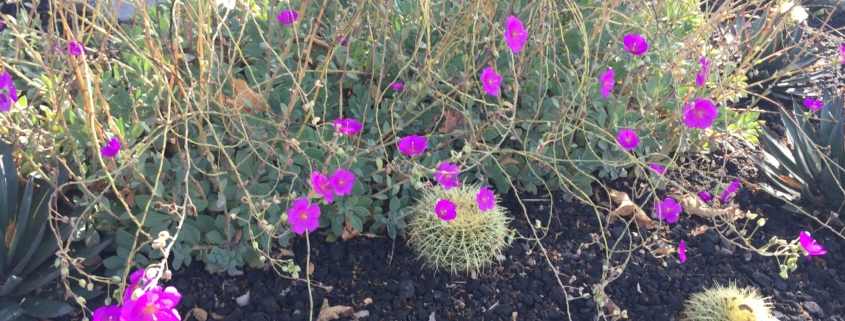From Writer to Writer/Activist
Those two punctured windows of the Mandalay Bay Hotel from the previous night’s news haunted me. I felt this same way after 9/11. I had never before imagined these particular acts of evil—a killer firing on a crowd from up high, or people using planes as weapons.
In this world, there are things you can watch out for, prepare for; but how can you watch out for these things if you can’t imagine them? To perch up high with a private arsenal, rev those guns so they become turbo-charged, and fire down on a crowd of 20,000; to intend maximum damage; to be a person no one else could predict—not neighbors, not co-workers, friends, or law enforcement—could turn against humanity.
The morning after the Las Vegas shooting, I was at my neighborhood Starbucks trying to write. I sat among other writers—familiar strangers—all there to work. We all pecked away at our computers and bought our lattes. There was the tall African American man with an intelligent, kind face who comes here every day like me to write at the same table in the corner; only recently we’ve started to nod to each other when we come and go. This solitary writer’s existence, working side-by-side, was not cutting it for me. I wanted to connect. I wanted to know what he thought about Las Vegas, about guns. Was he feeling outraged and impotent like me?
On the television that night, law enforcement, local leaders, and religious leaders from Las Vegas discussed making hotels safer, the heroism of people in the crowd, the grieving families. But they completely avoided the topic of gun control. Senator Chris Murphy of Connecticut told how, in the four and a half years since Sandy Hook, absolutely nothing had changed legislatively on gun control.
Hurricane Maria had just kicked the shit out of Puerto Rico, leaving them without power and drinking water for four to six months, and Trump had already begun to distance himself from helping in any real way, dunking paper towels jauntily to a forlorn crowd and tweeting that Puerto Ricans had to learn to help themselves.
My feelings of rage, frustration, impotence and isolation were overwhelming.
* * *
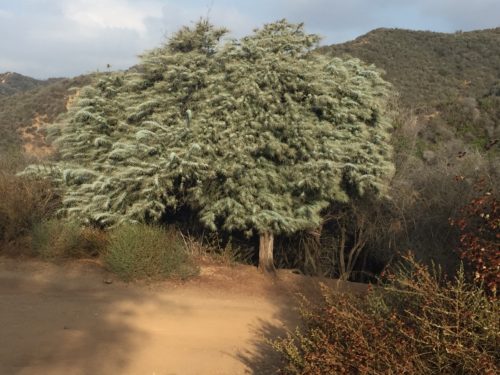
photo credit: Kathleen Katims
There are days when writing feels like the privilege of a lifetime, to be able to fulfill this dream that I have always imagined for myself. On days when I have said what I needed to say, unearthed something so true and fundamental, something I discovered about myself, I feel waves on waves of satisfaction that I get to do this work.
But there are other days when to write feels like being on the periphery of life, mining my own soul when what I really want is to be part of something, part of a team, a community, humanity. I miss being part of a family, especially as my kids have grown up and my family members are out in the world where they belong. I have started to fantasize about getting a waitressing job or temp job—anything where there are other warm bodies.
Apparently, I am in good company. A friend told me that Dave Eggers said that he started 826 Valencia—a now national non-profit that supports students’ creative and expository writing skills—because writing was so lonely. He said writing felt like being in the basement, under a swinging light bulb, with nothing but dust and himself.
The news, combined with the loneliness of writing, felt particularly soul-crushing.
At Starbucks the next morning, among these other writer-strangers, I felt that I didn’t just want to connect. I wanted to act.
* * *
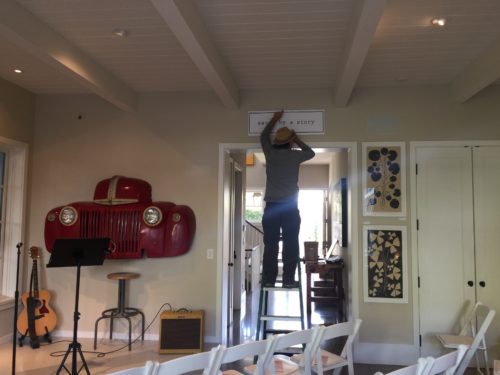
Jason Katims, photo credit: Kathleen Katims
A year and a half ago, I had an idea to bring storytellers together to make community, share their art and do good in the world—a storytelling salon with a purpose. I would pick a theme and then invite a diverse group of people to share stories. I called it Saved by a Story. This was something I did on the side—to be a writer was my main goal.
People who came to hear the stories could make a donation, and those donations would go to organizations helping underserved people have a voice. I’d had two events with a third coming up. I picked the theme, “Enough.” It seemed fitting.
A friend told me about an organization called Bard Prison Initiative. They help incarcerated men and women get a Bachelor’s Degree while they are serving time. My friend sent me a four-minute video of a graduation that took place in a maximum security prison. In the video, the men do not look like prisoners. They look like college graduates—proud, empowered, articulate, eager to give back and show how an education could transform their lives. The recidivism rate for prisoners in general population is 40%. Among the 500 BPI graduates, it is 2%. What a romantic, revolutionary, audacious answer to the broken institution of mass incarceration. I decided the “Enough” salon would benefit Bard Prison Initiative.
I took a break from the loneliness of writing. I started producing this Saved by a Story event.
I interviewed those BPI revolutionaries who told me about their incredible work. Max Kenner, the founder, told me what inspired him was watching the students’ children’s faces as their father or mother picked up their diploma. Rich Gamarra, an alum, told me about leaving prison after serving an eight-year sentence, getting his Masters at Columbia in Public Health, and becoming a program coordinator helping at-risk youth at the Department of Health and Mental Hygiene.
I asked writers to submit. So many people took time from busy schedules to write original stories on the topic of “Enough.” Submissions poured in and I got to read stories of all textures by lots of different voices with all kinds of takes on the theme. An Afghanistan war veteran, John O’Connor, wrote about how he was compelled to share his experiences to protect his baby boy from ever considering going to war.
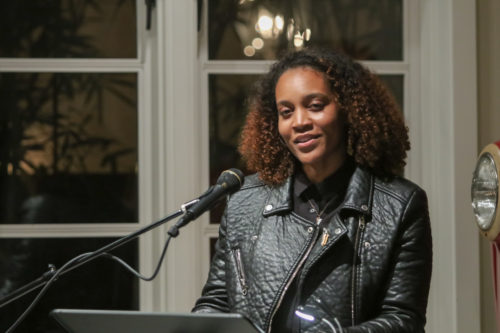
Chinaka Hodge, photo credit: JC Olivera Photography
A rap poet, Chinaka Hodge, wrote “A Family History of Enough,” about how the aunts and grandmothers of the family endured—“Every corner of our homeland, scaffolded on the spines of women,”—but ultimately rose up. “Know, don’t you, that you are endowed with every ounce of mettle you need. Know, little sister, you are your own stockade of enough.”
David Goodman wrote a hilarious story about his mother, “who was a bottomless well of need, requiring an endless amount of attention and admiration,” and who described his marriage as “a loss.” Eight storytellers and two musical acts performed.
It was so rich to talk to these writers and reflect about what I saw in their work.
I asked for help from family and friends and people I didn’t know well. So many people jumped in to help me film, record audio, cater, and arrange flowers. People donated generously—enough for three men to go through the Bard Prison Initiative program for a year. Saved by a Story broadened the community of people who knew and cared about the work BPI was doing.
* * *
Somewhere in the middle of planning this event and taking action, before the unbridled joy of the event actually happened, I realized my soul did not feel crushed. Yes, Las Vegas still happened, gun laws still need to be reformed, Puerto Rico was still in crisis, but I was working with other people to make a tangible difference in one tiny corner of the world. I felt in flow. I overflowed with hope, connection, and purpose.
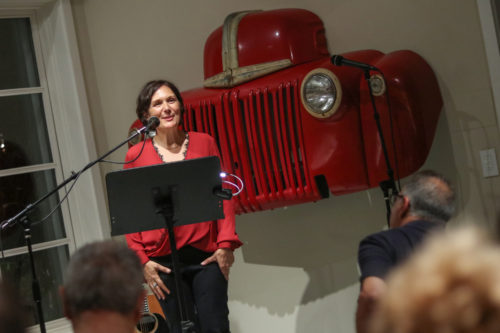
Kathleen Katims, photo credit: JC Olivera Photography
The event came and it was the icing on a cake that had already been baked. I loved working with a team of talented and passionate volunteers to make this happen and felt so proud of what we accomplished.
Going forward, I don’t see Saved by a Story or activism as things I do on the side. I see a marriage of activism and writing for me. It puts me in the world of people I love—writers, artists, people who are working to make a difference in the world, people with big generous hearts and visionary ideas. Having part of my life entwined with and working with others also takes the edge off of the loneliness of writing, and gives me more sustenance to go back to the quiet of writing. Most of all, to take action helps me feel that we are lighting a candle against the darkness of these times.
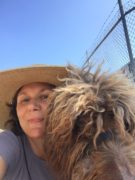 Kathleen Katims is a candidate for an MFA in Creative Writing at Antioch University. She writes fiction and creative non-fiction. Her work has been published in Verdad Magazine, The Penman Review, and Switchback. She is working on a book called Second Acts, interviewing, researching and writing about people who had interesting journeys out of being stuck and moved in the direction of their dreams. She is founder of Saved by a Story, a storytelling salon with a purpose—to do social good in the world. She lives in Los Angeles, California with her awesome husband, two cool cat kids and big brown dog.
Kathleen Katims is a candidate for an MFA in Creative Writing at Antioch University. She writes fiction and creative non-fiction. Her work has been published in Verdad Magazine, The Penman Review, and Switchback. She is working on a book called Second Acts, interviewing, researching and writing about people who had interesting journeys out of being stuck and moved in the direction of their dreams. She is founder of Saved by a Story, a storytelling salon with a purpose—to do social good in the world. She lives in Los Angeles, California with her awesome husband, two cool cat kids and big brown dog.

